Case Study: Understanding and Addressing Lisa's Mental Health Issues
VerifiedAdded on 2023/04/25
|11
|3335
|496
Case Study
AI Summary
This case study provides an in-depth analysis of Lisa, a patient struggling with mental health issues and substance abuse relapse. The analysis identifies three key issues contributing to her condition: paranoia, insecurity, and isolation. Lisa's paranoia manifests as a feeling of being watched and distrust of her boyfriend, while her insecurity stems from family rejection and a lack of self-worth. Isolation is exacerbated by a falling out with her mother and loss of contact with her social worker. The study emphasizes the role of mental health nurses in her recovery, highlighting the importance of collaboration, understanding her needs, and applying trauma-informed care principles. The proposed recovery plan focuses on re-establishing communication with her mother and social worker, addressing her paranoia through interactive sessions, and empowering her through personal and financial development. The case study concludes by advocating for the implementation of trauma-informed care principles to facilitate Lisa's recovery and reintegration into a normal social life. Desklib offers a wealth of similar solved assignments to aid students in their studies.
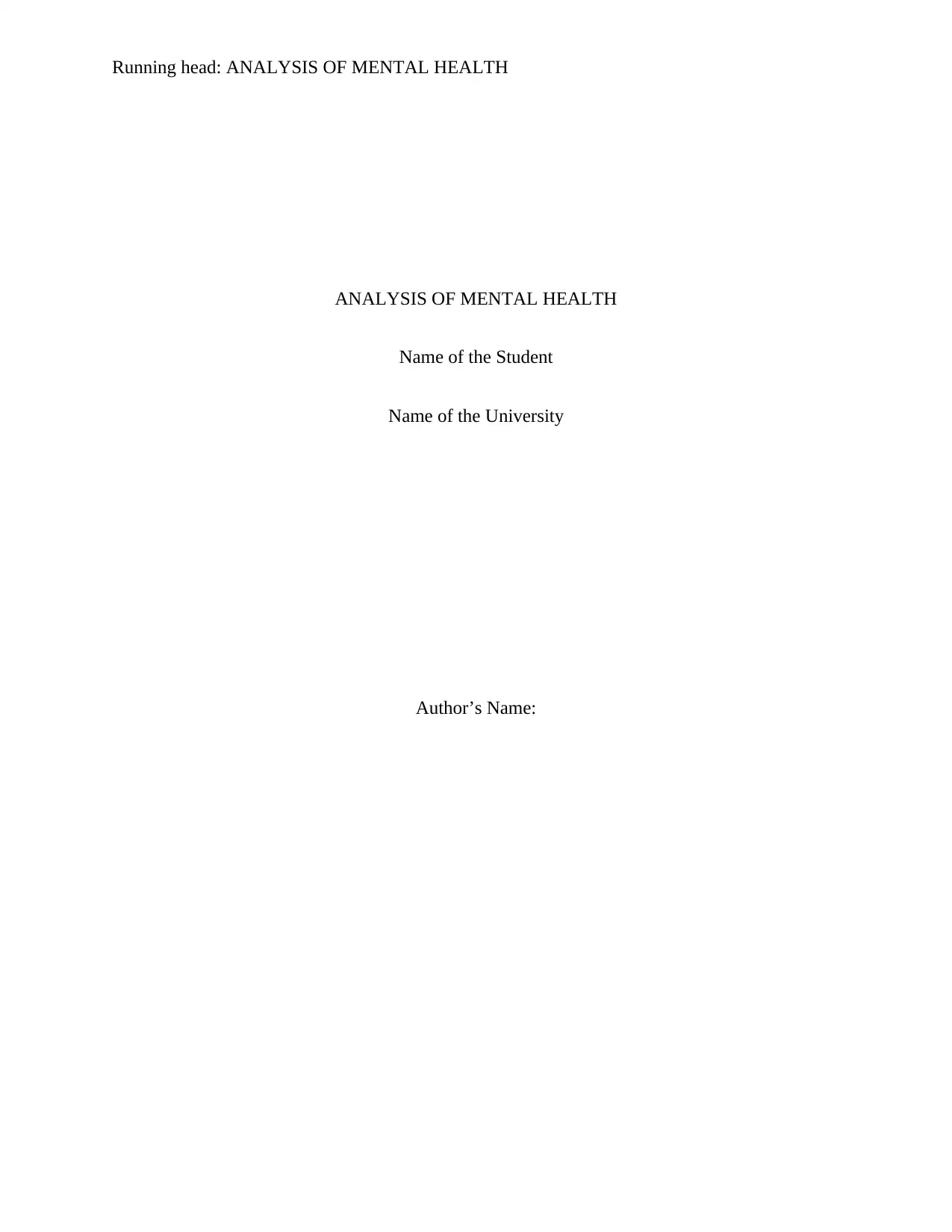
Running head: ANALYSIS OF MENTAL HEALTH
ANALYSIS OF MENTAL HEALTH
Name of the Student
Name of the University
Author’s Name:
ANALYSIS OF MENTAL HEALTH
Name of the Student
Name of the University
Author’s Name:
Paraphrase This Document
Need a fresh take? Get an instant paraphrase of this document with our AI Paraphraser
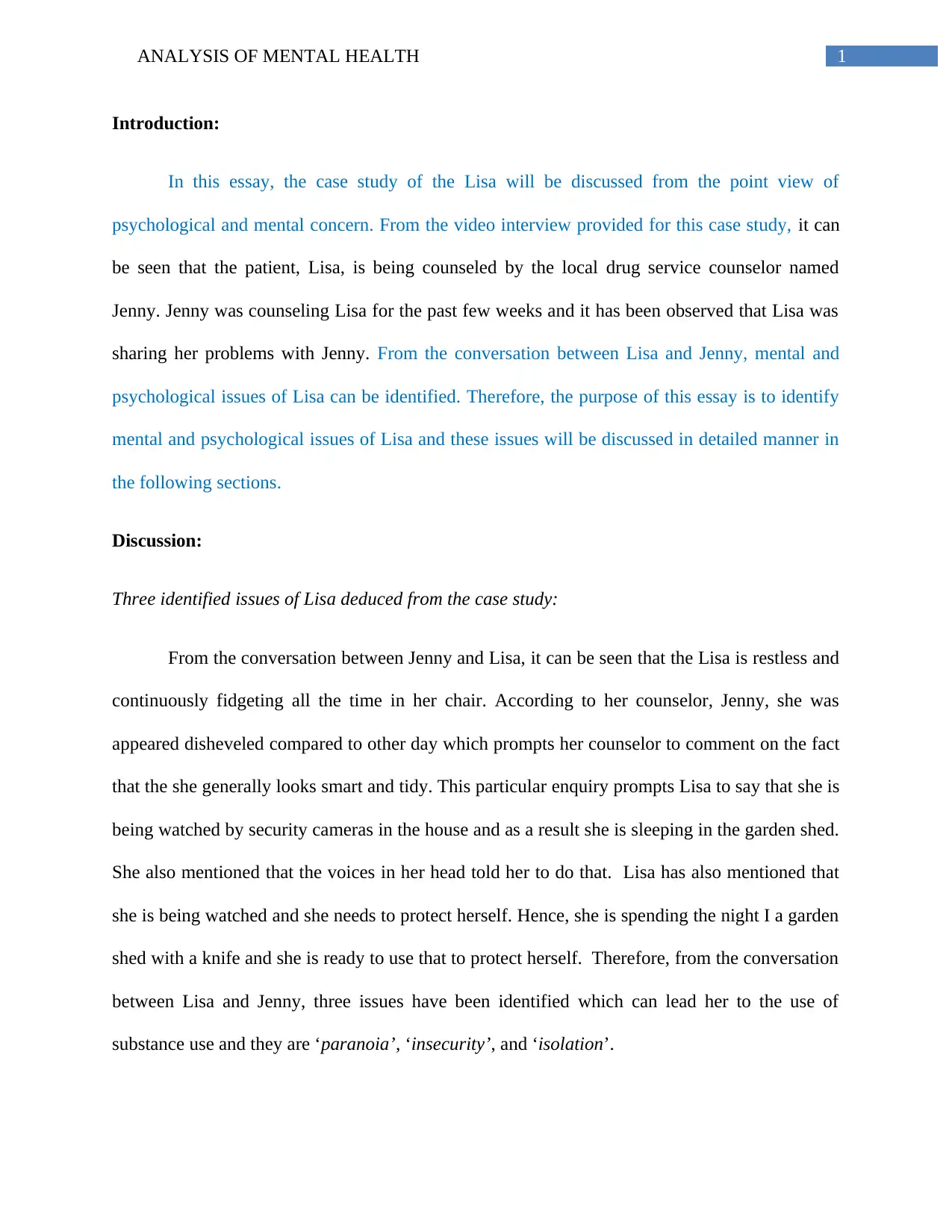
1ANALYSIS OF MENTAL HEALTH
Introduction:
In this essay, the case study of the Lisa will be discussed from the point view of
psychological and mental concern. From the video interview provided for this case study, it can
be seen that the patient, Lisa, is being counseled by the local drug service counselor named
Jenny. Jenny was counseling Lisa for the past few weeks and it has been observed that Lisa was
sharing her problems with Jenny. From the conversation between Lisa and Jenny, mental and
psychological issues of Lisa can be identified. Therefore, the purpose of this essay is to identify
mental and psychological issues of Lisa and these issues will be discussed in detailed manner in
the following sections.
Discussion:
Three identified issues of Lisa deduced from the case study:
From the conversation between Jenny and Lisa, it can be seen that the Lisa is restless and
continuously fidgeting all the time in her chair. According to her counselor, Jenny, she was
appeared disheveled compared to other day which prompts her counselor to comment on the fact
that the she generally looks smart and tidy. This particular enquiry prompts Lisa to say that she is
being watched by security cameras in the house and as a result she is sleeping in the garden shed.
She also mentioned that the voices in her head told her to do that. Lisa has also mentioned that
she is being watched and she needs to protect herself. Hence, she is spending the night I a garden
shed with a knife and she is ready to use that to protect herself. Therefore, from the conversation
between Lisa and Jenny, three issues have been identified which can lead her to the use of
substance use and they are ‘paranoia’, ‘insecurity’, and ‘isolation’.
Introduction:
In this essay, the case study of the Lisa will be discussed from the point view of
psychological and mental concern. From the video interview provided for this case study, it can
be seen that the patient, Lisa, is being counseled by the local drug service counselor named
Jenny. Jenny was counseling Lisa for the past few weeks and it has been observed that Lisa was
sharing her problems with Jenny. From the conversation between Lisa and Jenny, mental and
psychological issues of Lisa can be identified. Therefore, the purpose of this essay is to identify
mental and psychological issues of Lisa and these issues will be discussed in detailed manner in
the following sections.
Discussion:
Three identified issues of Lisa deduced from the case study:
From the conversation between Jenny and Lisa, it can be seen that the Lisa is restless and
continuously fidgeting all the time in her chair. According to her counselor, Jenny, she was
appeared disheveled compared to other day which prompts her counselor to comment on the fact
that the she generally looks smart and tidy. This particular enquiry prompts Lisa to say that she is
being watched by security cameras in the house and as a result she is sleeping in the garden shed.
She also mentioned that the voices in her head told her to do that. Lisa has also mentioned that
she is being watched and she needs to protect herself. Hence, she is spending the night I a garden
shed with a knife and she is ready to use that to protect herself. Therefore, from the conversation
between Lisa and Jenny, three issues have been identified which can lead her to the use of
substance use and they are ‘paranoia’, ‘insecurity’, and ‘isolation’.
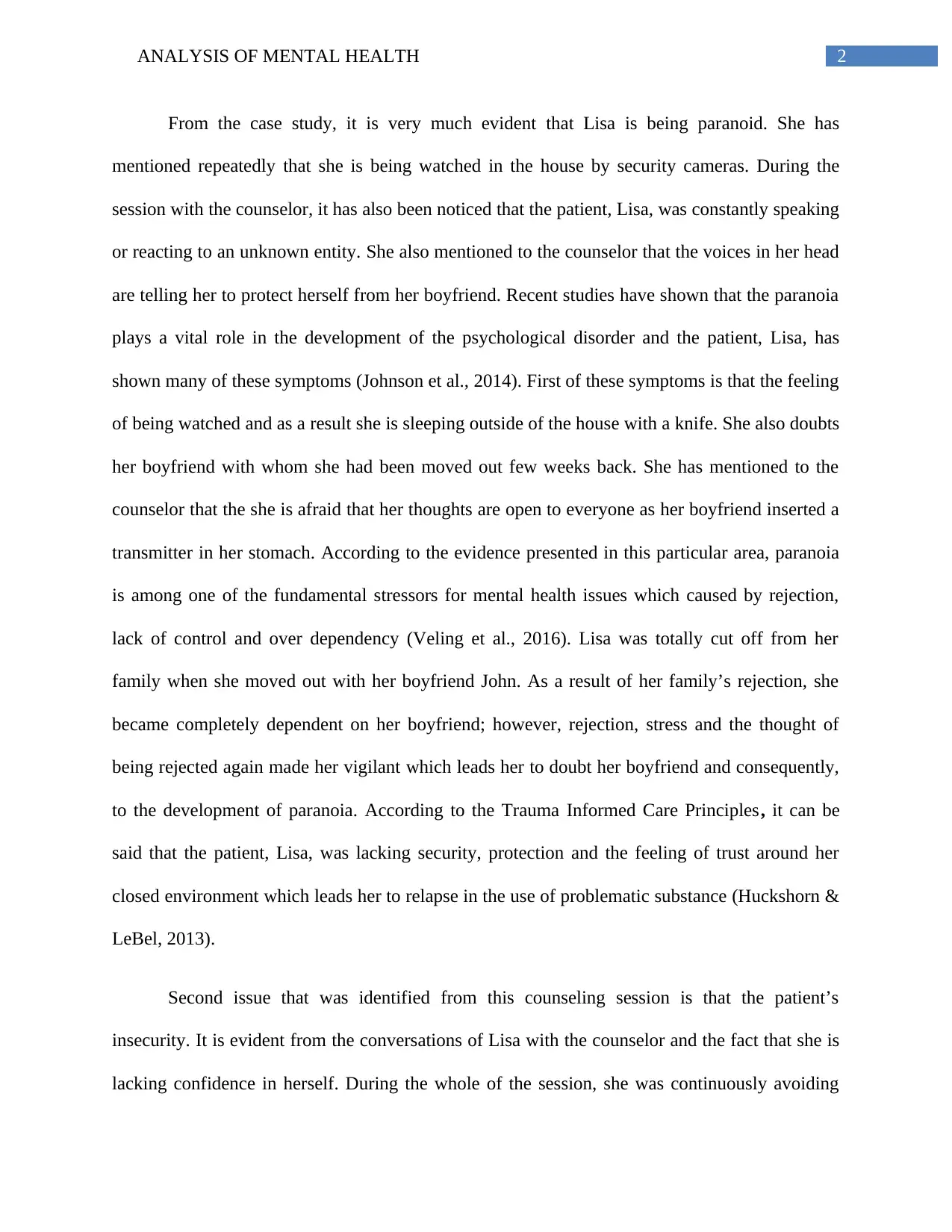
2ANALYSIS OF MENTAL HEALTH
From the case study, it is very much evident that Lisa is being paranoid. She has
mentioned repeatedly that she is being watched in the house by security cameras. During the
session with the counselor, it has also been noticed that the patient, Lisa, was constantly speaking
or reacting to an unknown entity. She also mentioned to the counselor that the voices in her head
are telling her to protect herself from her boyfriend. Recent studies have shown that the paranoia
plays a vital role in the development of the psychological disorder and the patient, Lisa, has
shown many of these symptoms (Johnson et al., 2014). First of these symptoms is that the feeling
of being watched and as a result she is sleeping outside of the house with a knife. She also doubts
her boyfriend with whom she had been moved out few weeks back. She has mentioned to the
counselor that the she is afraid that her thoughts are open to everyone as her boyfriend inserted a
transmitter in her stomach. According to the evidence presented in this particular area, paranoia
is among one of the fundamental stressors for mental health issues which caused by rejection,
lack of control and over dependency (Veling et al., 2016). Lisa was totally cut off from her
family when she moved out with her boyfriend John. As a result of her family’s rejection, she
became completely dependent on her boyfriend; however, rejection, stress and the thought of
being rejected again made her vigilant which leads her to doubt her boyfriend and consequently,
to the development of paranoia. According to the Trauma Informed Care Principles, it can be
said that the patient, Lisa, was lacking security, protection and the feeling of trust around her
closed environment which leads her to relapse in the use of problematic substance (Huckshorn &
LeBel, 2013).
Second issue that was identified from this counseling session is that the patient’s
insecurity. It is evident from the conversations of Lisa with the counselor and the fact that she is
lacking confidence in herself. During the whole of the session, she was continuously avoiding
From the case study, it is very much evident that Lisa is being paranoid. She has
mentioned repeatedly that she is being watched in the house by security cameras. During the
session with the counselor, it has also been noticed that the patient, Lisa, was constantly speaking
or reacting to an unknown entity. She also mentioned to the counselor that the voices in her head
are telling her to protect herself from her boyfriend. Recent studies have shown that the paranoia
plays a vital role in the development of the psychological disorder and the patient, Lisa, has
shown many of these symptoms (Johnson et al., 2014). First of these symptoms is that the feeling
of being watched and as a result she is sleeping outside of the house with a knife. She also doubts
her boyfriend with whom she had been moved out few weeks back. She has mentioned to the
counselor that the she is afraid that her thoughts are open to everyone as her boyfriend inserted a
transmitter in her stomach. According to the evidence presented in this particular area, paranoia
is among one of the fundamental stressors for mental health issues which caused by rejection,
lack of control and over dependency (Veling et al., 2016). Lisa was totally cut off from her
family when she moved out with her boyfriend John. As a result of her family’s rejection, she
became completely dependent on her boyfriend; however, rejection, stress and the thought of
being rejected again made her vigilant which leads her to doubt her boyfriend and consequently,
to the development of paranoia. According to the Trauma Informed Care Principles, it can be
said that the patient, Lisa, was lacking security, protection and the feeling of trust around her
closed environment which leads her to relapse in the use of problematic substance (Huckshorn &
LeBel, 2013).
Second issue that was identified from this counseling session is that the patient’s
insecurity. It is evident from the conversations of Lisa with the counselor and the fact that she is
lacking confidence in herself. During the whole of the session, she was continuously avoiding
⊘ This is a preview!⊘
Do you want full access?
Subscribe today to unlock all pages.

Trusted by 1+ million students worldwide
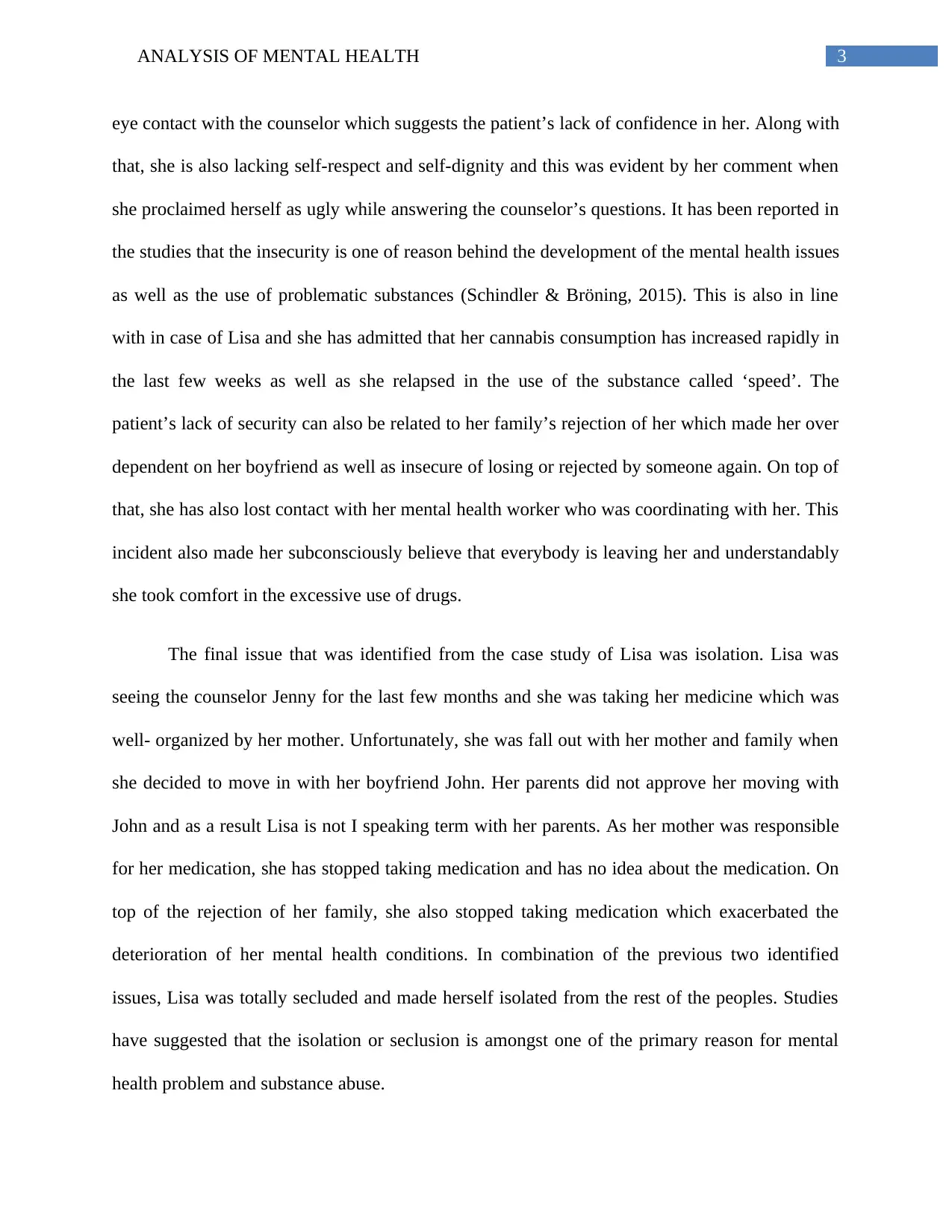
3ANALYSIS OF MENTAL HEALTH
eye contact with the counselor which suggests the patient’s lack of confidence in her. Along with
that, she is also lacking self-respect and self-dignity and this was evident by her comment when
she proclaimed herself as ugly while answering the counselor’s questions. It has been reported in
the studies that the insecurity is one of reason behind the development of the mental health issues
as well as the use of problematic substances (Schindler & Bröning, 2015). This is also in line
with in case of Lisa and she has admitted that her cannabis consumption has increased rapidly in
the last few weeks as well as she relapsed in the use of the substance called ‘speed’. The
patient’s lack of security can also be related to her family’s rejection of her which made her over
dependent on her boyfriend as well as insecure of losing or rejected by someone again. On top of
that, she has also lost contact with her mental health worker who was coordinating with her. This
incident also made her subconsciously believe that everybody is leaving her and understandably
she took comfort in the excessive use of drugs.
The final issue that was identified from the case study of Lisa was isolation. Lisa was
seeing the counselor Jenny for the last few months and she was taking her medicine which was
well- organized by her mother. Unfortunately, she was fall out with her mother and family when
she decided to move in with her boyfriend John. Her parents did not approve her moving with
John and as a result Lisa is not I speaking term with her parents. As her mother was responsible
for her medication, she has stopped taking medication and has no idea about the medication. On
top of the rejection of her family, she also stopped taking medication which exacerbated the
deterioration of her mental health conditions. In combination of the previous two identified
issues, Lisa was totally secluded and made herself isolated from the rest of the peoples. Studies
have suggested that the isolation or seclusion is amongst one of the primary reason for mental
health problem and substance abuse.
eye contact with the counselor which suggests the patient’s lack of confidence in her. Along with
that, she is also lacking self-respect and self-dignity and this was evident by her comment when
she proclaimed herself as ugly while answering the counselor’s questions. It has been reported in
the studies that the insecurity is one of reason behind the development of the mental health issues
as well as the use of problematic substances (Schindler & Bröning, 2015). This is also in line
with in case of Lisa and she has admitted that her cannabis consumption has increased rapidly in
the last few weeks as well as she relapsed in the use of the substance called ‘speed’. The
patient’s lack of security can also be related to her family’s rejection of her which made her over
dependent on her boyfriend as well as insecure of losing or rejected by someone again. On top of
that, she has also lost contact with her mental health worker who was coordinating with her. This
incident also made her subconsciously believe that everybody is leaving her and understandably
she took comfort in the excessive use of drugs.
The final issue that was identified from the case study of Lisa was isolation. Lisa was
seeing the counselor Jenny for the last few months and she was taking her medicine which was
well- organized by her mother. Unfortunately, she was fall out with her mother and family when
she decided to move in with her boyfriend John. Her parents did not approve her moving with
John and as a result Lisa is not I speaking term with her parents. As her mother was responsible
for her medication, she has stopped taking medication and has no idea about the medication. On
top of the rejection of her family, she also stopped taking medication which exacerbated the
deterioration of her mental health conditions. In combination of the previous two identified
issues, Lisa was totally secluded and made herself isolated from the rest of the peoples. Studies
have suggested that the isolation or seclusion is amongst one of the primary reason for mental
health problem and substance abuse.
Paraphrase This Document
Need a fresh take? Get an instant paraphrase of this document with our AI Paraphraser
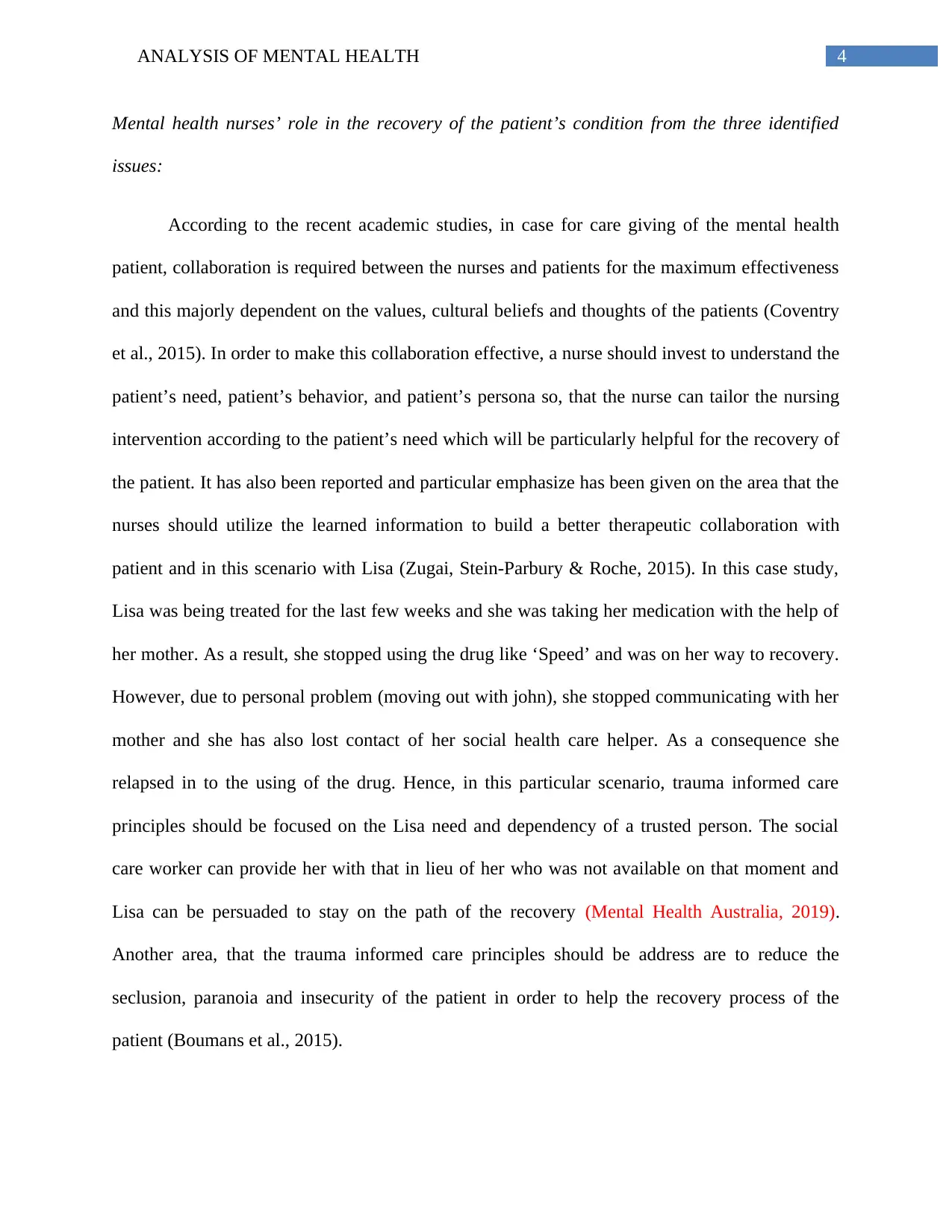
4ANALYSIS OF MENTAL HEALTH
Mental health nurses’ role in the recovery of the patient’s condition from the three identified
issues:
According to the recent academic studies, in case for care giving of the mental health
patient, collaboration is required between the nurses and patients for the maximum effectiveness
and this majorly dependent on the values, cultural beliefs and thoughts of the patients (Coventry
et al., 2015). In order to make this collaboration effective, a nurse should invest to understand the
patient’s need, patient’s behavior, and patient’s persona so, that the nurse can tailor the nursing
intervention according to the patient’s need which will be particularly helpful for the recovery of
the patient. It has also been reported and particular emphasize has been given on the area that the
nurses should utilize the learned information to build a better therapeutic collaboration with
patient and in this scenario with Lisa (Zugai, Stein-Parbury & Roche, 2015). In this case study,
Lisa was being treated for the last few weeks and she was taking her medication with the help of
her mother. As a result, she stopped using the drug like ‘Speed’ and was on her way to recovery.
However, due to personal problem (moving out with john), she stopped communicating with her
mother and she has also lost contact of her social health care helper. As a consequence she
relapsed in to the using of the drug. Hence, in this particular scenario, trauma informed care
principles should be focused on the Lisa need and dependency of a trusted person. The social
care worker can provide her with that in lieu of her who was not available on that moment and
Lisa can be persuaded to stay on the path of the recovery (Mental Health Australia, 2019).
Another area, that the trauma informed care principles should be address are to reduce the
seclusion, paranoia and insecurity of the patient in order to help the recovery process of the
patient (Boumans et al., 2015).
Mental health nurses’ role in the recovery of the patient’s condition from the three identified
issues:
According to the recent academic studies, in case for care giving of the mental health
patient, collaboration is required between the nurses and patients for the maximum effectiveness
and this majorly dependent on the values, cultural beliefs and thoughts of the patients (Coventry
et al., 2015). In order to make this collaboration effective, a nurse should invest to understand the
patient’s need, patient’s behavior, and patient’s persona so, that the nurse can tailor the nursing
intervention according to the patient’s need which will be particularly helpful for the recovery of
the patient. It has also been reported and particular emphasize has been given on the area that the
nurses should utilize the learned information to build a better therapeutic collaboration with
patient and in this scenario with Lisa (Zugai, Stein-Parbury & Roche, 2015). In this case study,
Lisa was being treated for the last few weeks and she was taking her medication with the help of
her mother. As a result, she stopped using the drug like ‘Speed’ and was on her way to recovery.
However, due to personal problem (moving out with john), she stopped communicating with her
mother and she has also lost contact of her social health care helper. As a consequence she
relapsed in to the using of the drug. Hence, in this particular scenario, trauma informed care
principles should be focused on the Lisa need and dependency of a trusted person. The social
care worker can provide her with that in lieu of her who was not available on that moment and
Lisa can be persuaded to stay on the path of the recovery (Mental Health Australia, 2019).
Another area, that the trauma informed care principles should be address are to reduce the
seclusion, paranoia and insecurity of the patient in order to help the recovery process of the
patient (Boumans et al., 2015).
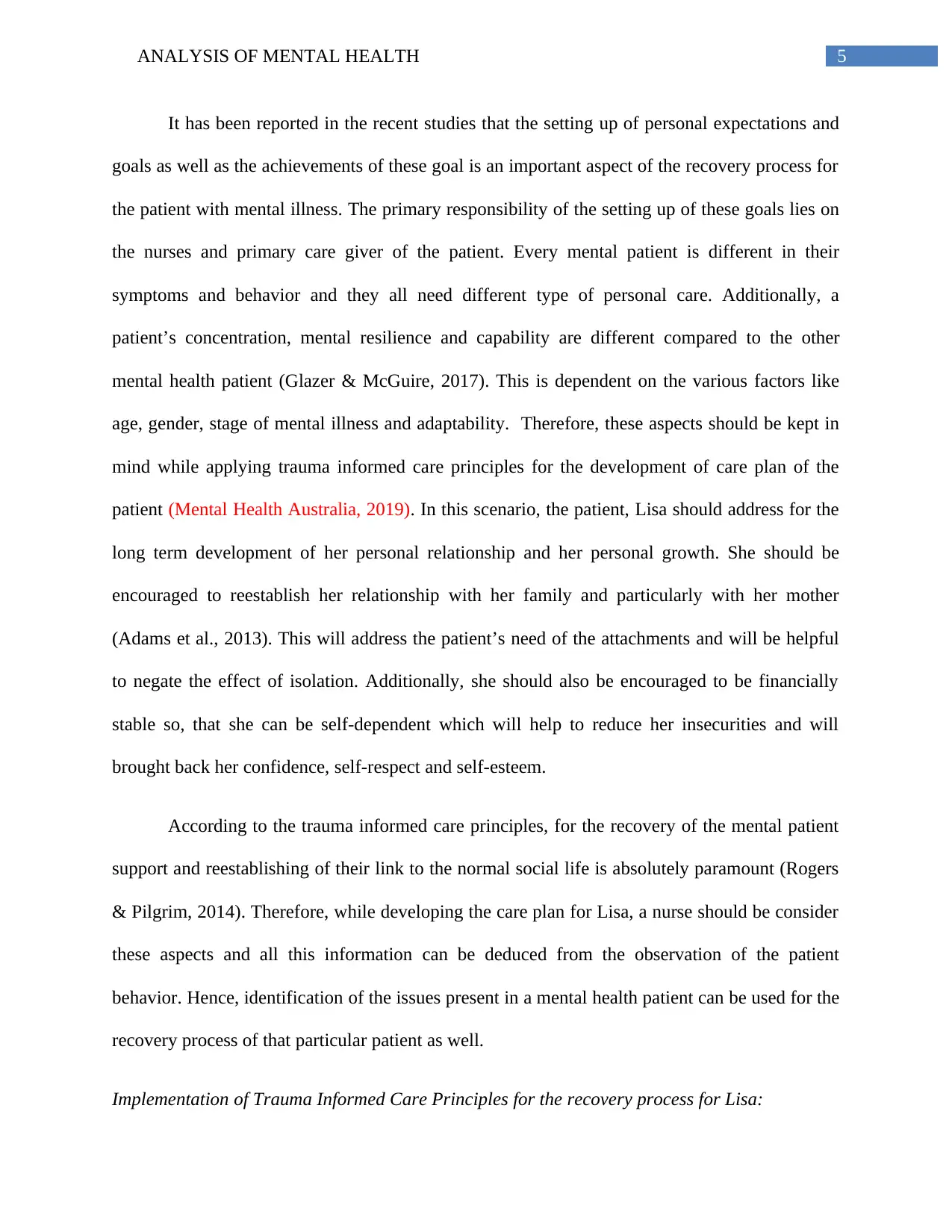
5ANALYSIS OF MENTAL HEALTH
It has been reported in the recent studies that the setting up of personal expectations and
goals as well as the achievements of these goal is an important aspect of the recovery process for
the patient with mental illness. The primary responsibility of the setting up of these goals lies on
the nurses and primary care giver of the patient. Every mental patient is different in their
symptoms and behavior and they all need different type of personal care. Additionally, a
patient’s concentration, mental resilience and capability are different compared to the other
mental health patient (Glazer & McGuire, 2017). This is dependent on the various factors like
age, gender, stage of mental illness and adaptability. Therefore, these aspects should be kept in
mind while applying trauma informed care principles for the development of care plan of the
patient (Mental Health Australia, 2019). In this scenario, the patient, Lisa should address for the
long term development of her personal relationship and her personal growth. She should be
encouraged to reestablish her relationship with her family and particularly with her mother
(Adams et al., 2013). This will address the patient’s need of the attachments and will be helpful
to negate the effect of isolation. Additionally, she should also be encouraged to be financially
stable so, that she can be self-dependent which will help to reduce her insecurities and will
brought back her confidence, self-respect and self-esteem.
According to the trauma informed care principles, for the recovery of the mental patient
support and reestablishing of their link to the normal social life is absolutely paramount (Rogers
& Pilgrim, 2014). Therefore, while developing the care plan for Lisa, a nurse should be consider
these aspects and all this information can be deduced from the observation of the patient
behavior. Hence, identification of the issues present in a mental health patient can be used for the
recovery process of that particular patient as well.
Implementation of Trauma Informed Care Principles for the recovery process for Lisa:
It has been reported in the recent studies that the setting up of personal expectations and
goals as well as the achievements of these goal is an important aspect of the recovery process for
the patient with mental illness. The primary responsibility of the setting up of these goals lies on
the nurses and primary care giver of the patient. Every mental patient is different in their
symptoms and behavior and they all need different type of personal care. Additionally, a
patient’s concentration, mental resilience and capability are different compared to the other
mental health patient (Glazer & McGuire, 2017). This is dependent on the various factors like
age, gender, stage of mental illness and adaptability. Therefore, these aspects should be kept in
mind while applying trauma informed care principles for the development of care plan of the
patient (Mental Health Australia, 2019). In this scenario, the patient, Lisa should address for the
long term development of her personal relationship and her personal growth. She should be
encouraged to reestablish her relationship with her family and particularly with her mother
(Adams et al., 2013). This will address the patient’s need of the attachments and will be helpful
to negate the effect of isolation. Additionally, she should also be encouraged to be financially
stable so, that she can be self-dependent which will help to reduce her insecurities and will
brought back her confidence, self-respect and self-esteem.
According to the trauma informed care principles, for the recovery of the mental patient
support and reestablishing of their link to the normal social life is absolutely paramount (Rogers
& Pilgrim, 2014). Therefore, while developing the care plan for Lisa, a nurse should be consider
these aspects and all this information can be deduced from the observation of the patient
behavior. Hence, identification of the issues present in a mental health patient can be used for the
recovery process of that particular patient as well.
Implementation of Trauma Informed Care Principles for the recovery process for Lisa:
⊘ This is a preview!⊘
Do you want full access?
Subscribe today to unlock all pages.

Trusted by 1+ million students worldwide
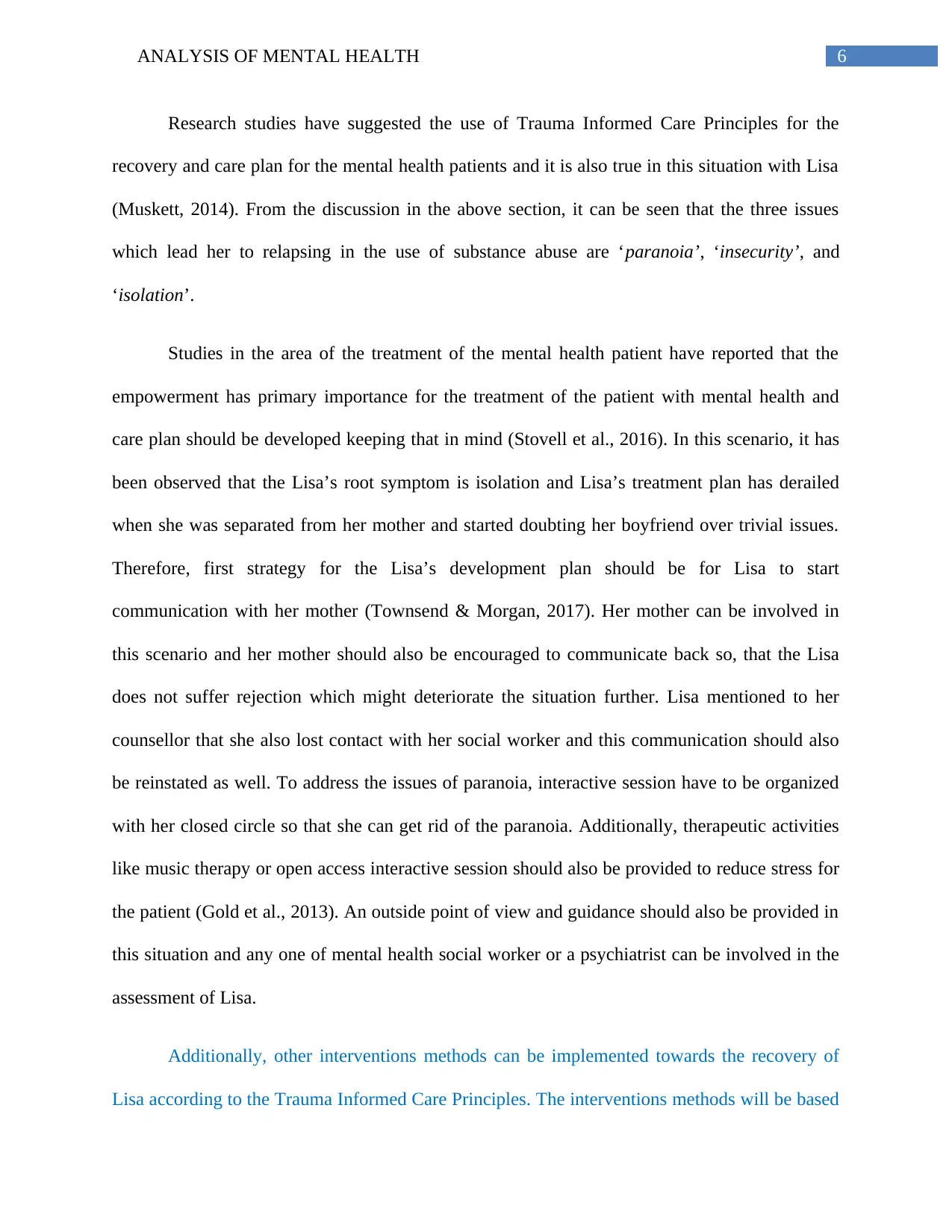
6ANALYSIS OF MENTAL HEALTH
Research studies have suggested the use of Trauma Informed Care Principles for the
recovery and care plan for the mental health patients and it is also true in this situation with Lisa
(Muskett, 2014). From the discussion in the above section, it can be seen that the three issues
which lead her to relapsing in the use of substance abuse are ‘paranoia’, ‘insecurity’, and
‘isolation’.
Studies in the area of the treatment of the mental health patient have reported that the
empowerment has primary importance for the treatment of the patient with mental health and
care plan should be developed keeping that in mind (Stovell et al., 2016). In this scenario, it has
been observed that the Lisa’s root symptom is isolation and Lisa’s treatment plan has derailed
when she was separated from her mother and started doubting her boyfriend over trivial issues.
Therefore, first strategy for the Lisa’s development plan should be for Lisa to start
communication with her mother (Townsend & Morgan, 2017). Her mother can be involved in
this scenario and her mother should also be encouraged to communicate back so, that the Lisa
does not suffer rejection which might deteriorate the situation further. Lisa mentioned to her
counsellor that she also lost contact with her social worker and this communication should also
be reinstated as well. To address the issues of paranoia, interactive session have to be organized
with her closed circle so that she can get rid of the paranoia. Additionally, therapeutic activities
like music therapy or open access interactive session should also be provided to reduce stress for
the patient (Gold et al., 2013). An outside point of view and guidance should also be provided in
this situation and any one of mental health social worker or a psychiatrist can be involved in the
assessment of Lisa.
Additionally, other interventions methods can be implemented towards the recovery of
Lisa according to the Trauma Informed Care Principles. The interventions methods will be based
Research studies have suggested the use of Trauma Informed Care Principles for the
recovery and care plan for the mental health patients and it is also true in this situation with Lisa
(Muskett, 2014). From the discussion in the above section, it can be seen that the three issues
which lead her to relapsing in the use of substance abuse are ‘paranoia’, ‘insecurity’, and
‘isolation’.
Studies in the area of the treatment of the mental health patient have reported that the
empowerment has primary importance for the treatment of the patient with mental health and
care plan should be developed keeping that in mind (Stovell et al., 2016). In this scenario, it has
been observed that the Lisa’s root symptom is isolation and Lisa’s treatment plan has derailed
when she was separated from her mother and started doubting her boyfriend over trivial issues.
Therefore, first strategy for the Lisa’s development plan should be for Lisa to start
communication with her mother (Townsend & Morgan, 2017). Her mother can be involved in
this scenario and her mother should also be encouraged to communicate back so, that the Lisa
does not suffer rejection which might deteriorate the situation further. Lisa mentioned to her
counsellor that she also lost contact with her social worker and this communication should also
be reinstated as well. To address the issues of paranoia, interactive session have to be organized
with her closed circle so that she can get rid of the paranoia. Additionally, therapeutic activities
like music therapy or open access interactive session should also be provided to reduce stress for
the patient (Gold et al., 2013). An outside point of view and guidance should also be provided in
this situation and any one of mental health social worker or a psychiatrist can be involved in the
assessment of Lisa.
Additionally, other interventions methods can be implemented towards the recovery of
Lisa according to the Trauma Informed Care Principles. The interventions methods will be based
Paraphrase This Document
Need a fresh take? Get an instant paraphrase of this document with our AI Paraphraser
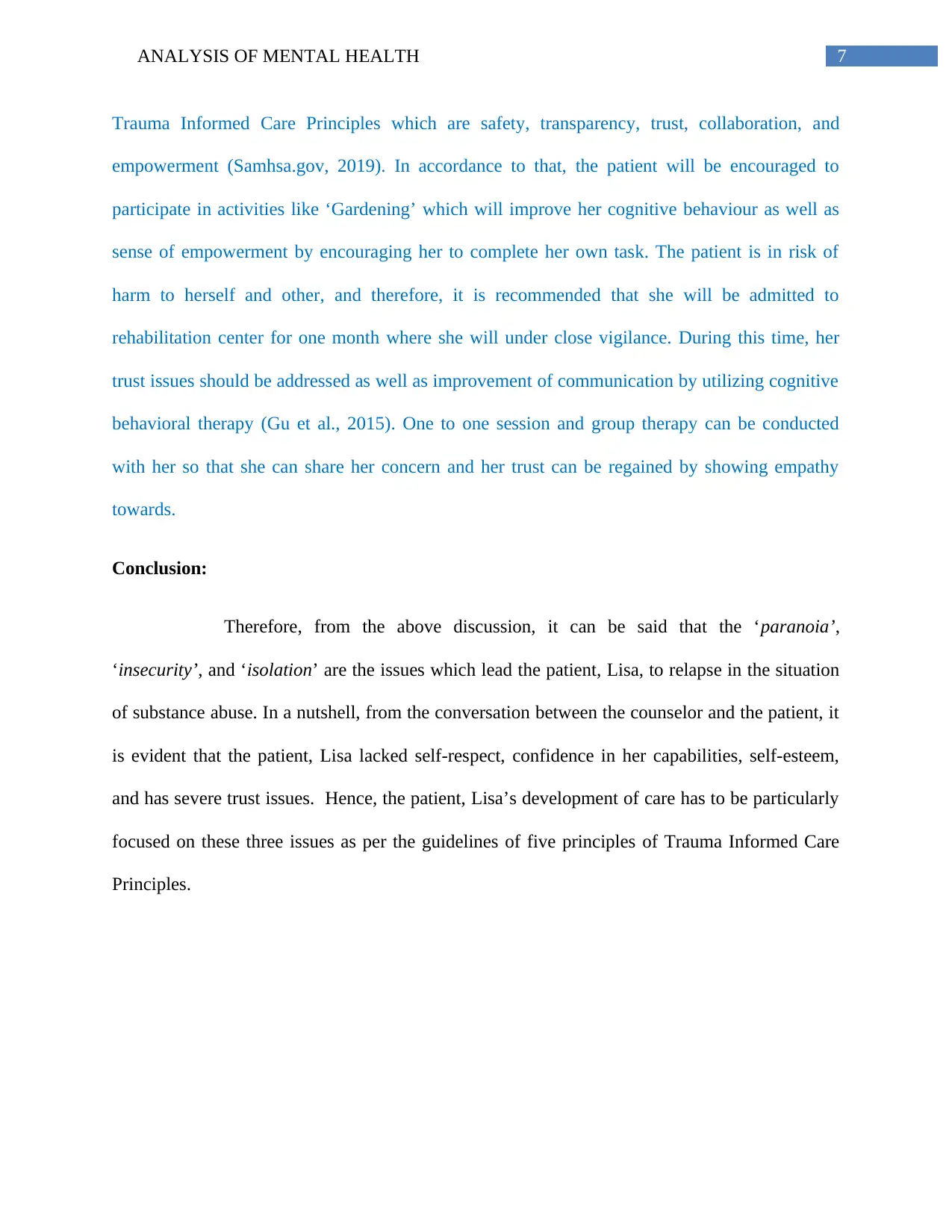
7ANALYSIS OF MENTAL HEALTH
Trauma Informed Care Principles which are safety, transparency, trust, collaboration, and
empowerment (Samhsa.gov, 2019). In accordance to that, the patient will be encouraged to
participate in activities like ‘Gardening’ which will improve her cognitive behaviour as well as
sense of empowerment by encouraging her to complete her own task. The patient is in risk of
harm to herself and other, and therefore, it is recommended that she will be admitted to
rehabilitation center for one month where she will under close vigilance. During this time, her
trust issues should be addressed as well as improvement of communication by utilizing cognitive
behavioral therapy (Gu et al., 2015). One to one session and group therapy can be conducted
with her so that she can share her concern and her trust can be regained by showing empathy
towards.
Conclusion:
Therefore, from the above discussion, it can be said that the ‘paranoia’,
‘insecurity’, and ‘isolation’ are the issues which lead the patient, Lisa, to relapse in the situation
of substance abuse. In a nutshell, from the conversation between the counselor and the patient, it
is evident that the patient, Lisa lacked self-respect, confidence in her capabilities, self-esteem,
and has severe trust issues. Hence, the patient, Lisa’s development of care has to be particularly
focused on these three issues as per the guidelines of five principles of Trauma Informed Care
Principles.
Trauma Informed Care Principles which are safety, transparency, trust, collaboration, and
empowerment (Samhsa.gov, 2019). In accordance to that, the patient will be encouraged to
participate in activities like ‘Gardening’ which will improve her cognitive behaviour as well as
sense of empowerment by encouraging her to complete her own task. The patient is in risk of
harm to herself and other, and therefore, it is recommended that she will be admitted to
rehabilitation center for one month where she will under close vigilance. During this time, her
trust issues should be addressed as well as improvement of communication by utilizing cognitive
behavioral therapy (Gu et al., 2015). One to one session and group therapy can be conducted
with her so that she can share her concern and her trust can be regained by showing empathy
towards.
Conclusion:
Therefore, from the above discussion, it can be said that the ‘paranoia’,
‘insecurity’, and ‘isolation’ are the issues which lead the patient, Lisa, to relapse in the situation
of substance abuse. In a nutshell, from the conversation between the counselor and the patient, it
is evident that the patient, Lisa lacked self-respect, confidence in her capabilities, self-esteem,
and has severe trust issues. Hence, the patient, Lisa’s development of care has to be particularly
focused on these three issues as per the guidelines of five principles of Trauma Informed Care
Principles.
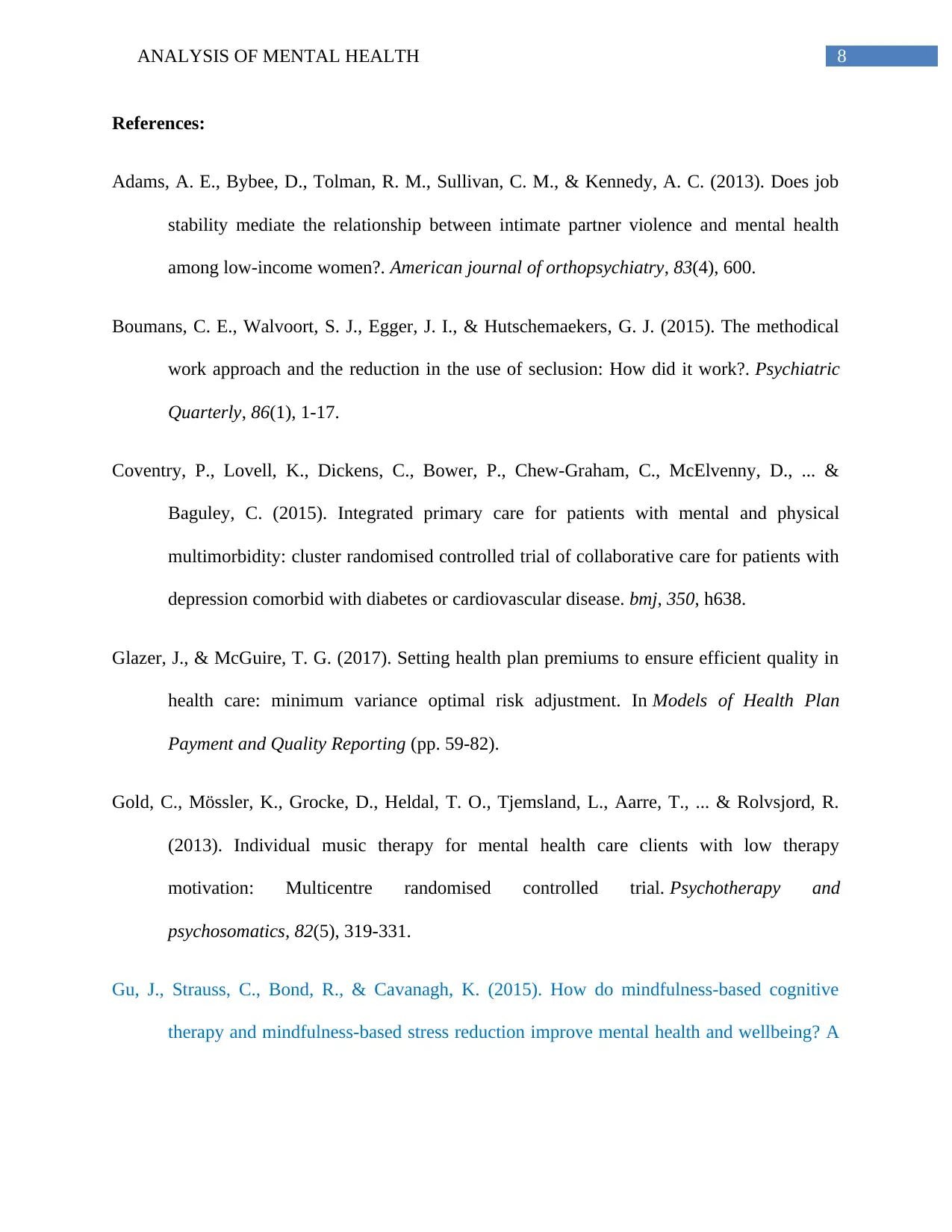
8ANALYSIS OF MENTAL HEALTH
References:
Adams, A. E., Bybee, D., Tolman, R. M., Sullivan, C. M., & Kennedy, A. C. (2013). Does job
stability mediate the relationship between intimate partner violence and mental health
among low‐income women?. American journal of orthopsychiatry, 83(4), 600.
Boumans, C. E., Walvoort, S. J., Egger, J. I., & Hutschemaekers, G. J. (2015). The methodical
work approach and the reduction in the use of seclusion: How did it work?. Psychiatric
Quarterly, 86(1), 1-17.
Coventry, P., Lovell, K., Dickens, C., Bower, P., Chew-Graham, C., McElvenny, D., ... &
Baguley, C. (2015). Integrated primary care for patients with mental and physical
multimorbidity: cluster randomised controlled trial of collaborative care for patients with
depression comorbid with diabetes or cardiovascular disease. bmj, 350, h638.
Glazer, J., & McGuire, T. G. (2017). Setting health plan premiums to ensure efficient quality in
health care: minimum variance optimal risk adjustment. In Models of Health Plan
Payment and Quality Reporting (pp. 59-82).
Gold, C., Mössler, K., Grocke, D., Heldal, T. O., Tjemsland, L., Aarre, T., ... & Rolvsjord, R.
(2013). Individual music therapy for mental health care clients with low therapy
motivation: Multicentre randomised controlled trial. Psychotherapy and
psychosomatics, 82(5), 319-331.
Gu, J., Strauss, C., Bond, R., & Cavanagh, K. (2015). How do mindfulness-based cognitive
therapy and mindfulness-based stress reduction improve mental health and wellbeing? A
References:
Adams, A. E., Bybee, D., Tolman, R. M., Sullivan, C. M., & Kennedy, A. C. (2013). Does job
stability mediate the relationship between intimate partner violence and mental health
among low‐income women?. American journal of orthopsychiatry, 83(4), 600.
Boumans, C. E., Walvoort, S. J., Egger, J. I., & Hutschemaekers, G. J. (2015). The methodical
work approach and the reduction in the use of seclusion: How did it work?. Psychiatric
Quarterly, 86(1), 1-17.
Coventry, P., Lovell, K., Dickens, C., Bower, P., Chew-Graham, C., McElvenny, D., ... &
Baguley, C. (2015). Integrated primary care for patients with mental and physical
multimorbidity: cluster randomised controlled trial of collaborative care for patients with
depression comorbid with diabetes or cardiovascular disease. bmj, 350, h638.
Glazer, J., & McGuire, T. G. (2017). Setting health plan premiums to ensure efficient quality in
health care: minimum variance optimal risk adjustment. In Models of Health Plan
Payment and Quality Reporting (pp. 59-82).
Gold, C., Mössler, K., Grocke, D., Heldal, T. O., Tjemsland, L., Aarre, T., ... & Rolvsjord, R.
(2013). Individual music therapy for mental health care clients with low therapy
motivation: Multicentre randomised controlled trial. Psychotherapy and
psychosomatics, 82(5), 319-331.
Gu, J., Strauss, C., Bond, R., & Cavanagh, K. (2015). How do mindfulness-based cognitive
therapy and mindfulness-based stress reduction improve mental health and wellbeing? A
⊘ This is a preview!⊘
Do you want full access?
Subscribe today to unlock all pages.

Trusted by 1+ million students worldwide
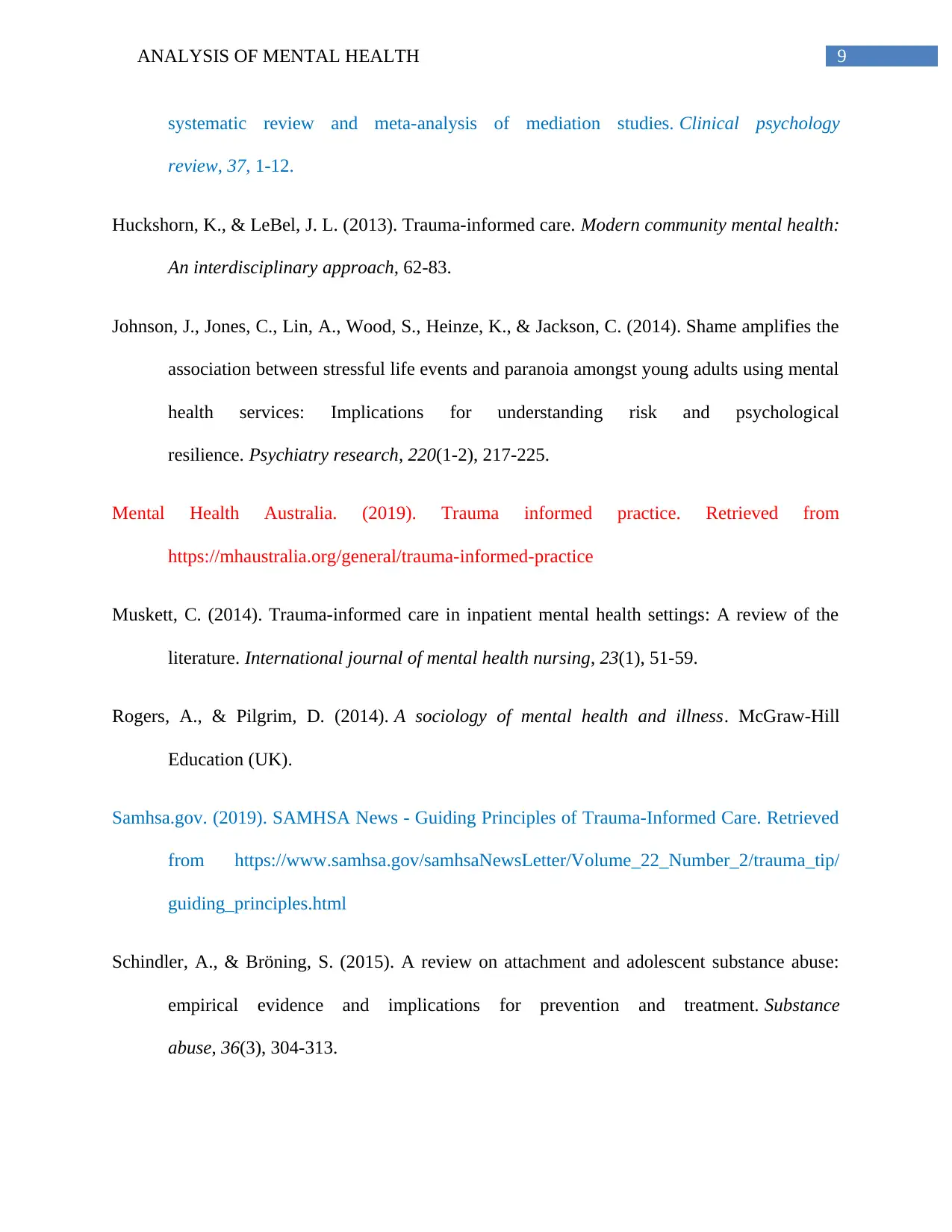
9ANALYSIS OF MENTAL HEALTH
systematic review and meta-analysis of mediation studies. Clinical psychology
review, 37, 1-12.
Huckshorn, K., & LeBel, J. L. (2013). Trauma-informed care. Modern community mental health:
An interdisciplinary approach, 62-83.
Johnson, J., Jones, C., Lin, A., Wood, S., Heinze, K., & Jackson, C. (2014). Shame amplifies the
association between stressful life events and paranoia amongst young adults using mental
health services: Implications for understanding risk and psychological
resilience. Psychiatry research, 220(1-2), 217-225.
Mental Health Australia. (2019). Trauma informed practice. Retrieved from
https://mhaustralia.org/general/trauma-informed-practice
Muskett, C. (2014). Trauma‐informed care in inpatient mental health settings: A review of the
literature. International journal of mental health nursing, 23(1), 51-59.
Rogers, A., & Pilgrim, D. (2014). A sociology of mental health and illness. McGraw-Hill
Education (UK).
Samhsa.gov. (2019). SAMHSA News - Guiding Principles of Trauma-Informed Care. Retrieved
from https://www.samhsa.gov/samhsaNewsLetter/Volume_22_Number_2/trauma_tip/
guiding_principles.html
Schindler, A., & Bröning, S. (2015). A review on attachment and adolescent substance abuse:
empirical evidence and implications for prevention and treatment. Substance
abuse, 36(3), 304-313.
systematic review and meta-analysis of mediation studies. Clinical psychology
review, 37, 1-12.
Huckshorn, K., & LeBel, J. L. (2013). Trauma-informed care. Modern community mental health:
An interdisciplinary approach, 62-83.
Johnson, J., Jones, C., Lin, A., Wood, S., Heinze, K., & Jackson, C. (2014). Shame amplifies the
association between stressful life events and paranoia amongst young adults using mental
health services: Implications for understanding risk and psychological
resilience. Psychiatry research, 220(1-2), 217-225.
Mental Health Australia. (2019). Trauma informed practice. Retrieved from
https://mhaustralia.org/general/trauma-informed-practice
Muskett, C. (2014). Trauma‐informed care in inpatient mental health settings: A review of the
literature. International journal of mental health nursing, 23(1), 51-59.
Rogers, A., & Pilgrim, D. (2014). A sociology of mental health and illness. McGraw-Hill
Education (UK).
Samhsa.gov. (2019). SAMHSA News - Guiding Principles of Trauma-Informed Care. Retrieved
from https://www.samhsa.gov/samhsaNewsLetter/Volume_22_Number_2/trauma_tip/
guiding_principles.html
Schindler, A., & Bröning, S. (2015). A review on attachment and adolescent substance abuse:
empirical evidence and implications for prevention and treatment. Substance
abuse, 36(3), 304-313.
Paraphrase This Document
Need a fresh take? Get an instant paraphrase of this document with our AI Paraphraser
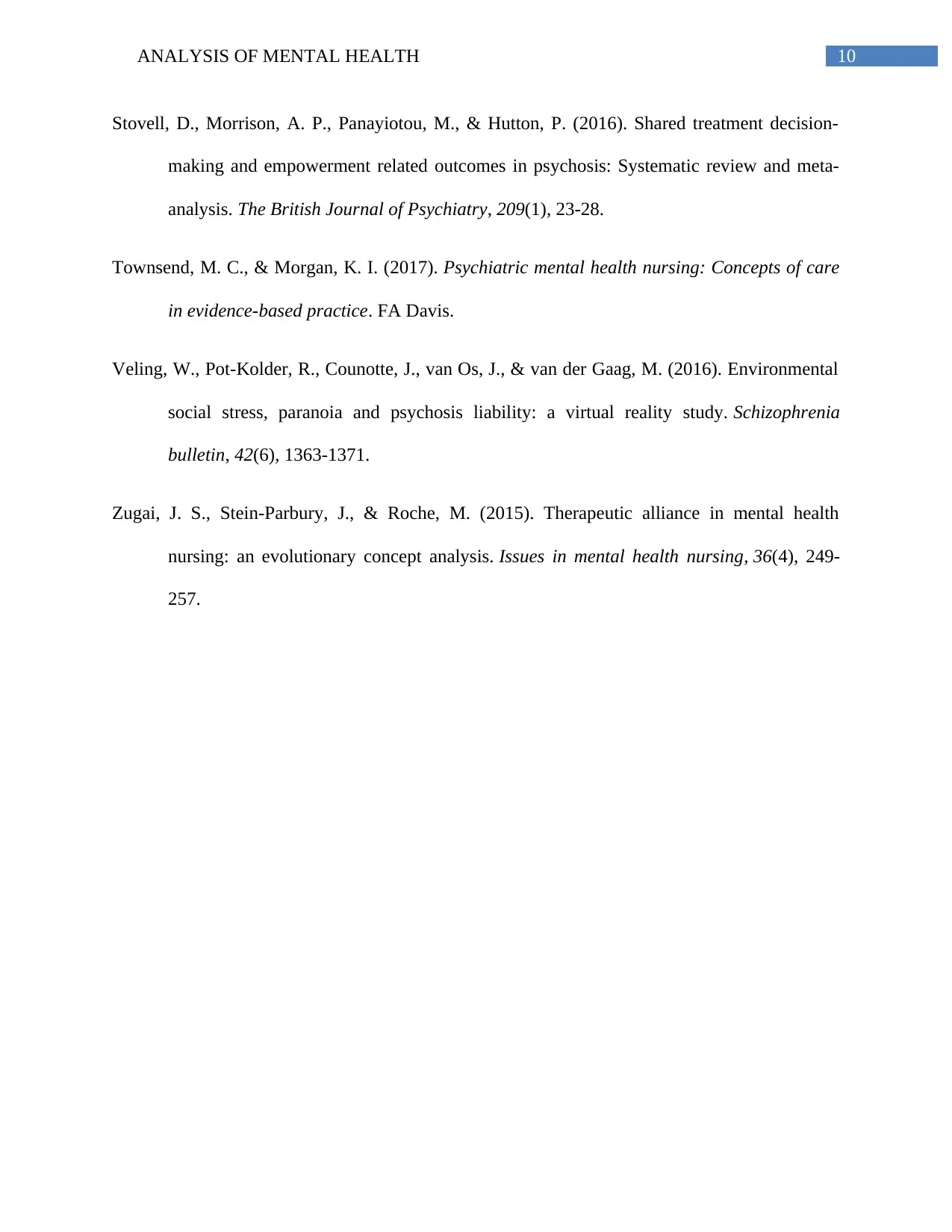
10ANALYSIS OF MENTAL HEALTH
Stovell, D., Morrison, A. P., Panayiotou, M., & Hutton, P. (2016). Shared treatment decision-
making and empowerment related outcomes in psychosis: Systematic review and meta-
analysis. The British Journal of Psychiatry, 209(1), 23-28.
Townsend, M. C., & Morgan, K. I. (2017). Psychiatric mental health nursing: Concepts of care
in evidence-based practice. FA Davis.
Veling, W., Pot-Kolder, R., Counotte, J., van Os, J., & van der Gaag, M. (2016). Environmental
social stress, paranoia and psychosis liability: a virtual reality study. Schizophrenia
bulletin, 42(6), 1363-1371.
Zugai, J. S., Stein-Parbury, J., & Roche, M. (2015). Therapeutic alliance in mental health
nursing: an evolutionary concept analysis. Issues in mental health nursing, 36(4), 249-
257.
Stovell, D., Morrison, A. P., Panayiotou, M., & Hutton, P. (2016). Shared treatment decision-
making and empowerment related outcomes in psychosis: Systematic review and meta-
analysis. The British Journal of Psychiatry, 209(1), 23-28.
Townsend, M. C., & Morgan, K. I. (2017). Psychiatric mental health nursing: Concepts of care
in evidence-based practice. FA Davis.
Veling, W., Pot-Kolder, R., Counotte, J., van Os, J., & van der Gaag, M. (2016). Environmental
social stress, paranoia and psychosis liability: a virtual reality study. Schizophrenia
bulletin, 42(6), 1363-1371.
Zugai, J. S., Stein-Parbury, J., & Roche, M. (2015). Therapeutic alliance in mental health
nursing: an evolutionary concept analysis. Issues in mental health nursing, 36(4), 249-
257.
1 out of 11
Related Documents
Your All-in-One AI-Powered Toolkit for Academic Success.
+13062052269
info@desklib.com
Available 24*7 on WhatsApp / Email
![[object Object]](/_next/static/media/star-bottom.7253800d.svg)
Unlock your academic potential
Copyright © 2020–2026 A2Z Services. All Rights Reserved. Developed and managed by ZUCOL.





